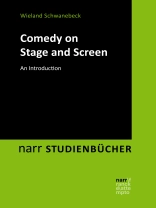This book introduces readers to the genre of comedy, both on the stage and on the screen. It chronicles the history of comedy, starting with Ancient Greece, before summarising key chapters in Anglophone literary history, such as Shakespearean comedy, Restoration comedy, and Theatre of the Absurd. The book features an overview of key comic techniques (including slapstick, puns, and wit), as well as concise summaries of major theoretical debates (including the superiority theory and the Freudian account of laughter). The book works with many examples from the history of Anglophone comedy, including Oscar Wilde, Monty Python, and classic sitcoms. It addresses current research into cringe humour and the controversial topic of diversity in the field of comedy, and it connects classical tropes of comedy (like the fool or the marriage plot) to present-day examples. The book thus serves as an up-to-date study guide for everyone interested in comedy and its various subgenres.
Table des matières
Chapter 1: Introduction: ‘Tragedy Tomorrow – Comedy Tonight’
Chapter 2: Ancient forerunners
Chapter 3: Why so serious?
Chapter 4: So Shakespearean, so romantic!
Chapter 5: Life as a carnival
Chapter 6: Raunchy Restoration
Chapter 7: The comedy of manners
Chapter 8: But this is absurd!
Chapter 9: And now for something completely grotesque
Chapter 10: The more, the merrier
Chapter 11: What a farce!
Chapter 12: Stop that, it’s silly!
Chapter 13: So funny it hurts
Chapter 14: Comedy at the crossroads
A propos de l’auteur
Wieland Schwanebeck is a researcher in literary/cultural studies. His interests include impostors, twins, James Bond, and comedy.












